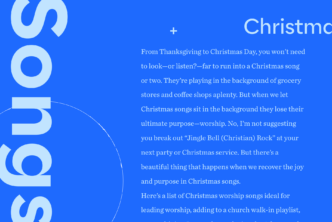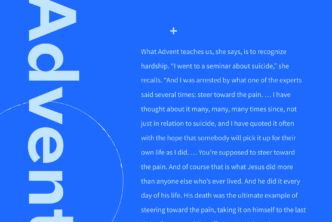We don’t like to talk about death. When we absolutely have to, we fall back on euphemisms like “passed on,” “no longer with us,” or “didn’t make it.” Left to our own devices, we’ll ignore it entirely.
The arts are more willing to engage the drama and inevitability of death; as a culture, we read novels and watch movies to try to make sense of it. On our own, though, we’re sociologically and psychologically unequipped to deal with death’s reality.
I’m convinced that we support huge cosmetology and plastic-surgery industries not only because of our worship of beauty, but because we fear aging as the harbinger of death. Not only do we want to elude death; we long to avoid the very things we associate with it. As Paul tells us in Romans 8, we, like all of creation, struggle to be liberated from our bondage to decay.
You do not give me up
David wrote many Psalms while under great duress, and one of my favorites is Psalm 16. Unlike many of David’s laments, this Psalm acknowledges his troubles in a grateful and almost casual manner.
“Therefore my heart is glad, and my soul rejoices;
my body also rests secure.
For you do not give me up to Sheol,
or let your faithful one see the Pit.”
—Psalm 16:9–10
Within the context of Psalm 16, this is a powerful testimony of trust for someone under the constant threat of death. In light of Christ’s Resurrection, it becomes something else entirely . . .
When Peter addresses the gathered crowd at Pentecost, he calls this Psalm prophetic. More than just David trusting God to preserve his life, Psalm 16 becomes a prophecy of Christ’s defeat of death and his complete reset on what it means to be human.
The Resurrection changes everything
Psalm 16 was right—both contextually and prophetically. God delivered David from immediate threat, and Christ from the grave. We’re beneficiaries of both David’s confidence and Christ’s triumph, and through us all of creation benefits.
Death has been declawed and gagged. We ride in Christ’s train as his victory parade publicly shames the powers and authorities who sought to subject us to corruption and decay. The Resurrection is our hope, life, and victory.
In a culture that fears and shrinks away from death, we have a privilege and sacred responsibility to share our optimistic assurance that death doesn’t have the final answer. God is at work through the power of the Resurrection, redeeming the world to himself, and he will never willingly give us up to Sheol or let his faithful ones see the pit.




